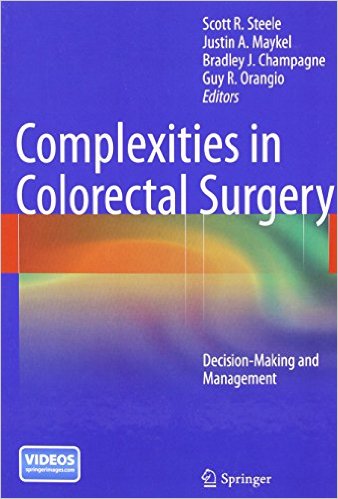 Editors: Scott R. Steele, MD; Justin A. Maykel, MD; Bradley J. Champagne, MD; and Guy R. Orangio, MD
Editors: Scott R. Steele, MD; Justin A. Maykel, MD; Bradley J. Champagne, MD; and Guy R. Orangio, MD
Publisher: Springer International Publishing – 632 pages
Book Review by: Nano Khilnani
These questions often arise in the minds of practitioners and students alike in various specialties in medicine: “Why another book on this subject?” and “How is this different, and what needs will it serve?”
To these questions, Dr. Robert D. Madoff, who wrote the Foreword to this book, provides the answer. And that answer in essence is that there are always unsolved problems, and the solutions to those problems are discovered with the advancement of knowledge gathered from new research, more experience, greater insight, and innovations in technology.
He illustrates how such advancement of knowledge is shared in this book in a before-and-after approach as reveled in the titles of the chapters.
In the book by John Gallagher published about 50 years ago entitled Surgery of the Anus, Rectum and Colon (which by the way set the standard for textbooks of colorectal surgery, writes Dr. Madoff) the titles of just three of the chapters are presented on the left, whereas the chapters in the present volume on the same topics are shown on the right. Notice what we’ve learned and how much more empowered we are now by the new knowledge we have gained:
Previous Current
Diverticular Disease Diverticulitis: Beyond the Basics (chapter 4)
Rectal Cancer Recurrent Rectal Cancer (chapter 15)
The Ileal Pouch Ileal Pouch Complications (chapter 17)
Problems such as failed anastomosis, pelvic bleeding and chronic pain are addressed in this book. Technical advances, such as transanal endoscopic microsurgery (TEMS) and transanal minimally invasive surgery (TAMIS) are now available options to treat patients. And in procedures involving the abdomen, single-incision laparoscopic surgery or SILS is sometimes used these days.
Eighty-two specialists in colorectal, gastrointestinal, general, and pediatric surgery in hospitals and medical schools in the United States and six other countries – Brazil, Canada, Israel, the Netherlands, Norway, and Sweden – wrote the 42 chapters in this book, which are organized around six Parts, namely:
- Preoperative
- The Abdomen
- The Pelvis
- Anorectal Disease
- Special Situations
- Beyond the Operating Room
The four editors of this large volume write that a complex set of considerations need to be taken into account by colorectal surgeons before, during and after the procedures. Some of the more common difficulties and issues they face are the following:
- Never-ending assortment of complex disease processes
- Complications that permeate colorectal surgery
- Technical challenges of surgery
- Demanding pre-operative evaluation and decision-making
- Postoperative functional changes that impact patients’ short- and long-term quality of life
- Economic implications of care for the patient, family and healthcare system
- Internal struggle between providing best patient-centered care and formulating optimal approaches for complex clinical scenarios
- Ideal next steps in managing patients who experience postoperative complications
- Algorithms of care do not exist or are not founded in reliable evidence-based recommendations
In response to addressing the above challenges that colorectal surgeons have to deal with, Drs. Scott R. Steele, Justin A. Maykel, Bradley J. Champagne, and Guy R. Orangio have developed this large volume. It covers the strategic evaluation, specific approaches, and detailed management techniques currently utilized in colorectal surgery to care for patients with complex problems.
The 82 authors of the 42 chapters of this book cover a wide range of topics. They make evidence-based recommendations, use their knowledge and experience of many years to make sound decisions, and share their insight where data is insufficient. All these resources have helped these experts reach positive outcomes for patients in their practice.
This book will help you make decisions such as these and others:
- What is the optimal algorithm for patients with fecal incontinence with or without a sphincter injury?
- How do we manage and time surgery for the patient with metastatic cancer?
- When do we operate on smoldering diverticulitis?
- What is the best option for a failing J-pouch or rectal anastomosis?
This book will help you take the best course of action.
Editors:
Scott R. Steele, MD works in the Division of Colon and Rectal Surgery in the Department of Surgery at Madigan Army Medical Center in Fort Lewis, Washington.
Justin A. Maykel, MD works in the Division of Colorectal Surgery in the Department of Surgery at UMass Memorial Medical Center at the University of Massachusetts Medical School in Worcester, Massachusetts.
Bradley J. Champagne, MD works in the Division of Colon and Rectal Surgery in the Department of Surgery at Case Western Reserve University School of Medicine Cleveland Hospitals in Cleveland, Ohio.
Guy R. Orangio, MD works in the Division of Colon and Rectal Surgery in the Department of Surgery at Louisiana State University Health Science Center, at LSU School of Medicine in New Orleans, Louisiana.







